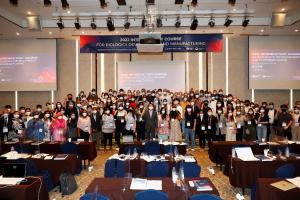IVI kicks off first Introductory Course for Biologics Development and Manufacturing to train 117 people from 25 LMICs
2-week program expected to help increase LMICs’ capability in local bio production to address vaccine inequity, enhance global pandemic preparedness.
SEOUL, REPUBLIC OF KOREA, July 18, 2022 /EINPresswire.com/ -- The International Vaccine Institute (IVI) kicked off a global training course to educate biomanufacturing workforce including more than 117 people from low- and middle-income countries (LMICs) and 33 from Korea. The ‘2022 Introductory Course for Biologics Development and Manufacturing’ will take place at Hoam Faculty House Convention Center at Seoul National University in the Republic of Korea from July 18 – 29 to train participants from 25 countries to help strengthen LMICs’ capabilities in local production of vaccines and biologics.The trainees include early-career employees in private and public manufacturing companies and government officials from LMICs who have been invited to attend free of charge thanks to funding support from the Korean Ministry of Health and Welfare (MOHW). A group of 33 young Koreans are also participating in the course as trainees to gain knowledge, expertise, and global networking experience. The two-week course is the first of the 2022 Global Bio-Intensive Training Courses, which are run by IVI in partnership with the Korean MOHW to promote Korea as a Global Training Hub for Biomanufacturing.
IVI was designated by MOHW in February as an operator of 2022 Global Bio-Intensive Training Courses, a first-of-its-kind global program supported by the Government of Korea as part of their joint efforts to address vaccine inequity and enhance pandemic preparedness. In the same month, Korea was named by the WHO as a Global Training Hub for Biomanufacturing (GTH-B), a central institution that supports self-sustainable vaccine production in LMICs by providing manufacturing operation training for vaccines and biologics.
The new training course will address the entire continuum of vaccine research, development, production, and use, including Immunology, Product Development, Vaccine Technology, Clinical immunology, Vaccine Development, Adjuvant, Clinical Development, Data Management, Epidemiology, Health Economy, Intellectual Property, Pre-Clinical, Post Market Authorization, and Regulatory Affairs, and include a series of special lectures and case studies. The course will be presented by a faculty team of nearly 30 experts from around the world including IVI, Coalition for Epidemic Preparedness Innovations (CEPI), Seoul National University, and Bill & Melinda Gates Medical Research Institute.
During the pandemic, one of the important resource gaps identified by experts in enabling local vaccine manufacturing was the availability of skilled, trained personnel in biomanufacturing, a highly technologically demanding field. “To support countries that are trying to bridge this gap, the Global Training Hub for Biomanufacturing was created by MOHW, with support from WHO and the WHO Academy,” said Dr. Lee Kang-ho, head of Korea’s K-Vaccine Hub initiative. “The program will cater to the needs of companies that develop and manufacture bioproducts in different countries, and government personnel dealing bioproduction capacities.”
Capacity building is a pillar of IVI’s mission, and the international organization has been running its flagship ‘International Vaccinology Course’ over the past 20 years and has trained more than 1,700 people from countries worldwide offline in 2000-2019 and 1,114 certified online participants in 2021.
“IVI is the world’s only international organization devoted to the discovery, development and delivery of vaccines for global health, and is uniquely equipped to provide quality training in vaccine development and biomanufacturing,” said Ms. Alice Lee, course coordinator and Director of Business Development at IVI. “IVI aims to provide world-class training courses to enable LMICs to strengthen their national capabilities in vaccines and biologics manufacturing.”
“Enhancing the manufacturing capacity of biopharmaceuticals in LMICs is crucial to increasing local production of vaccines and biologicals. Training of skilled, qualified personnel is key to boosting their manufacturing capacity,” said Dr. Jerome Kim, Director General of IVI. “Korea has excellent manufacturing capacity of its bio-companies and robust training infrastructure, with its government committed to supporting LMICs. IVI is privileged to partner with MOHW and the WHO to empower LMICs to increase local production of vaccines and biologics and improve equal access to vaccines.”
IVI in partnership with MOHW is set to train a total of 450 trainees in vaccine and biologics manufacturing through 2022 Global Bio-Intensive Training Courses by November this year. The trainees include nearly 150 people in the upcoming introductory course, plus 300 (200 from overseas, and 100 from Korea) at a 3-week introductory course on quality management of global pharmaceutical standards, which is scheduled in October.
###
About the International Vaccine Institute
The International Vaccine Institute (IVI) is a nonprofit inter-governmental organization established in 1997 at the initiative of the United Nations Development Programme (UNDP). Headquartered in Seoul, South Korea, IVI was the first international organization hosted by Korea. IVI has 39 countries and the World Health Organization (WHO) on its treaty, including Korea, Sweden, India, and Finland as state funders.
Our mandate is to make vaccines available and accessible for the world’s most vulnerable people. We focus on infectious diseases of global health importance such as cholera, typhoid, shigella, salmonella, schistosomiasis, Group A Strep, Hepatitis A, HPV, TB, HIV, MERS, COVID-19, as well as antimicrobial resistance. For more information, please visit https://www.ivi.int1
Aerie Em
International Vaccine Institute
aerie.em@ivi.int
Visit us on social media:
Facebook
Twitter
LinkedIn
1 https://www.ivi.int

